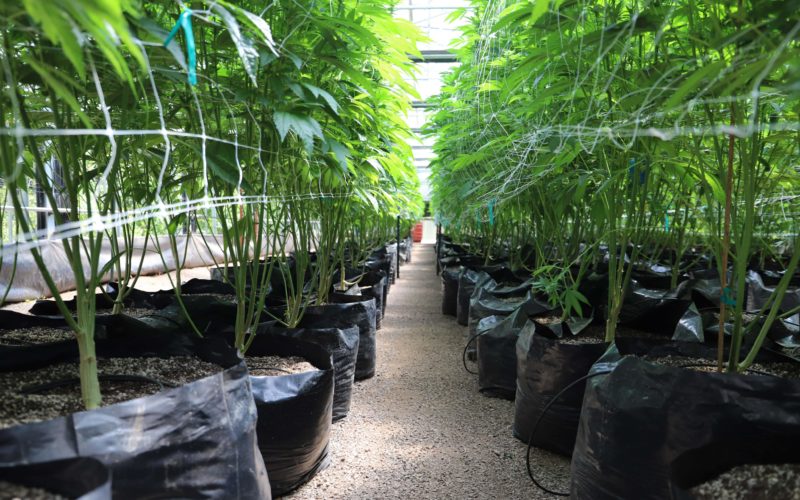Business
Mississippi Medical Weed Grower Ordered To Destroy $1 Million Worth of Plants

The largest licensed medical cannabis grower in Mississippi was ordered to destroy thousands of cannabis plants worth about $1 million for failing to abide by regulations, according to the state health department.
Mississippi medical marijuana regulators announced that the largest cannabis grower licensed by the state so far was directed to destroy thousands of plants worth approximately $1 million for failure to follow regulations. The company, Mockingbird Cannabis LLC, was also ordered to halt some operations and make improvements to one of its cultivation sites, according to the Mississippi State Department of Health.
Voters in Mississippi legalized medical marijuana in the state in 2020 with the passage of Initiative Measure 65, although regulated sales of medicinal cannabis are not expected to begin until early next year, according to an update from state officials issued on Thursday.
In early October, an article and photographs published by Mississippi Today reported on a Mockingbird facility cultivating cannabis plants in a manner contrary to state regulations. Mockingbird had reportedly been growing plants in hoop houses at a site 12 miles from its main facility. The company had failed to enter the plants at the site into the state’s seed-to-sale tracking system and did not maintain the required security standards. A Mockingbird official said that about 20,000 plants had been growing at the facility.
In response, the health department issued a letter to the company listing corrective actions it should take but declined to answer questions about the situation. Competing medical cannabis cultivators protested, arguing that Mockingbird was permitted to grow medical marijuana without complying with regulations, giving the company a competitive advantage as the regulated market prepares to launch. Competing cultivators had reportedly been told that growing operations must be limited to one site and could not take place in greenhouses.
Mississippi Regulators Issue Sanctions
On Thursday, Kris Jones Adcock, the director of the Mississippi Medical Cannabis Program, announced that further action had been taken against Mockingbird by state regulators.
“There is an order in place where they have some halt on operations and some impact on their operations and some capital improvements they have to do to satisfy that corrective action,” Adcock said at a press conference on Thursday. “They also had to destroy a number of plants in their inventory … I don’t know the exact number, there was upwards of $1 million of inventory destroyed — right at about 5,000 plants.”
Mockingbird co-founder Marcy Croft declined to answer questions about the department’s actions on Thursday, but sent a written statement to Mississippi Today pledging to “continue to fully cooperate with the Mississippi Department of Health, our fellow growers, dispensaries owners and healthcare providers to ensure a robust and effective market in our state.”
Although 47 cultivators have already been licensed to grow medicinal cannabis in Mississippi, the health department has reported that the medical marijuana program is in a provisional phase, with a staff of only three and no investigators yet hired. Despite the apparent lack of oversight, State Health Officer Dr. Dan Edney said on Thursday that he is reasonably sure significant amounts of marijuana are not being diverted to the illicit market and that preventing diversion is the department’s top priority. Officials said they expect to have nine more staffers hired by the end of November and to contract with private companies to help with compliance.
“We are doing that to the best of our ability,” Edney said. “We are not going to be able to get that to zero, but we are doing as best we can under the regulatory authority given to us … and as we are bringing on more staff next month it will be easier.”
Cannabis Coming to Dispensaries by Next Year
State regulators gave an update on the progress of rolling out Mississippi’s medical marijuana program, which was approved by voters nearly two years ago with the passage of Initiated Measure 65. Officials said that while progress on the rollout of the program is being made, dispensary sales of medical marijuana are not expected to begin until early 2023.
“It will be the end of the year or sometime early next year before product is tested and available,” Adcock said, according to a report from the Clarion-Ledger.
As of October 27, state regulators had approved medical marijuana licenses for 406 patients, 117 practitioners, 138 dispensaries, 47 cultivators, eight processors, three disposal companies and two testing labs, as well as 491 work permits. All of the approved businesses have been issued provisional licenses, which are valid for 120 days and allow state regulators to monitor the businesses before issuing a long-term license.
“I think we have enough practitioners now to take care of the patients that are currently certified, but we will be recruiting more,” Edney said. “We’re seeing increases every day in the number of practitioners that are interested in the program, and we’re seeing increases every day in the number of patients interested in the program.”
Edney added that the health department has done “yeoman’s work” in creating a new program in a short amount of time, noting that the “key tenets” of the program will be ensuring public safety and reducing “any opportunity of diversion that we possibly can.”
“Make no mistake the agency has been regulating this industry from day one and will continue to do so as we go forward,” Edney said.
Business
New Mexico cannabis operator fined, loses license for alleged BioTrack fraud

New Mexico regulators fined a cannabis operator nearly $300,000 and revoked its license after the company allegedly created fake reports in the state’s traceability software.
The New Mexico Cannabis Control Division (CCD) accused marijuana manufacturer and retailer Golden Roots of 11 violations, according to Albuquerque Business First.
Golden Roots operates the The Cannabis Revolution Dispensary.
The majority of the violations are related to the Albuquerque company’s improper use of BioTrack, which has been New Mexico’s track-and-trace vendor since 2015.
The CCD alleges Golden Roots reported marijuana production only two months after it had received its vertically integrated license, according to Albuquerque Business First.
Because cannabis takes longer than two months to be cultivated, the CCD was suspicious of the report.
After inspecting the company’s premises, the CCD alleged Golden Roots reported cultivation, transportation and sales in BioTrack but wasn’t able to provide officers who inspected the site evidence that the operator was cultivating cannabis.
In April, the CCD revoked Golden Roots’ license and issued a $10,000 fine, according to the news outlet.
The company requested a hearing, which the regulator scheduled for Sept. 1.
At the hearing, the CCD testified that the company’s dried-cannabis weights in BioTrack were suspicious because they didn’t seem to accurately reflect how much weight marijuana loses as it dries.
Company employees also poorly accounted for why they were making adjustments in the system of up to 24 pounds of cannabis, making comments such as “bad” or “mistake” in the software, Albuquerque Business First reported.
Golden Roots was fined $298,972.05 – the amount regulators allege the company made selling products that weren’t properly accounted for in BioTrack.
The CCD has been cracking down on cannabis operators accused of selling products procured from out-of-state or not grown legally:
- Regulators alleged in August that Albuquerque dispensary Sawmill Sweet Leaf sold out-of-state products and didn’t have a license for extraction.
- Paradise Exotics Distro lost its license in July after regulators alleged the company sold products made in California.
Golden Roots was the first alleged rulebreaker in New Mexico to be asked to pay a large fine.
Source: https://mjbizdaily.com/new-mexico-cannabis-operator-fined-loses-license-for-alleged-biotrack-fraud/
Business
Marijuana companies suing US attorney general in federal prohibition challenge

Four marijuana companies, including a multistate operator, have filed a lawsuit against U.S. Attorney General Merrick Garland in which they allege the federal MJ prohibition under the Controlled Substances Act is no longer constitutional.
According to the complaint, filed Thursday in U.S. District Court in Massachusetts, retailer Canna Provisions, Treevit delivery service CEO Gyasi Sellers, cultivator Wiseacre Farm and MSO Verano Holdings Corp. are all harmed by “the federal government’s unconstitutional ban on cultivating, manufacturing, distributing, or possessing intrastate marijuana.”
Verano is headquartered in Chicago but has operations in Massachusetts; the other three operators are based in Massachusetts.
The lawsuit seeks a ruling that the “Controlled Substances Act is unconstitutional as applied to the intrastate cultivation, manufacture, possession, and distribution of marijuana pursuant to state law.”
The companies want the case to go before the U.S. Supreme Court.
They hired prominent law firm Boies Schiller Flexner to represent them.
The New York-based firm’s principal is David Boies, whose former clients include Microsoft, former presidential candidate Al Gore and Elizabeth Holmes’ disgraced startup Theranos.
Similar challenges to the federal Controlled Substances Act (CSA) have failed.
One such challenge led to a landmark Supreme Court decision in 2005.
In Gonzalez vs. Raich, the highest court in the United States ruled in a 6-3 decision that the commerce clause of the U.S. Constitution gave Congress the power to outlaw marijuana federally, even though state laws allow the cultivation and sale of cannabis.
In the 18 years since that ruling, 23 states and the District of Columbia have legalized adult-use marijuana and the federal government has allowed a multibillion-dollar cannabis industry to thrive.
Since both Congress and the U.S. Department of Justice, currently headed by Garland, have declined to intervene in state-licensed marijuana markets, the key facts that led to the Supreme Court’s 2005 ruling “no longer apply,” Boies said in a statement Thursday.
“The Supreme Court has since made clear that the federal government lacks the authority to regulate purely intrastate commerce,” Boies said.
“Moreover, the facts on which those precedents are based are no longer true.”
Verano President Darren Weiss said in a statement the company is “prepared to bring this case all the way to the Supreme Court in order to align federal law with how Congress has acted for years.”
While the Biden administration’s push to reschedule marijuana would help solve marijuana operators’ federal tax woes, neither rescheduling nor modest Congressional reforms such as the SAFER Banking Act “solve the fundamental issue,” Weiss added.
“The application of the CSA to lawful state-run cannabis business is an unconstitutional overreach on state sovereignty that has led to decades of harm, failed businesses, lost jobs, and unsafe working conditions.”
Business
Alabama to make another attempt Dec. 1 to award medical cannabis licenses

Alabama regulators are targeting Dec. 1 to award the first batch of medical cannabis business licenses after the agency’s first two attempts were scrapped because of scoring errors and litigation.
The first licenses will be awarded to individual cultivators, delivery providers, processors, dispensaries and state testing labs, according to the Alabama Medical Cannabis Commission (AMCC).
Then, on Dec. 12, the AMCC will award licenses for vertically integrated operations, a designation set primarily for multistate operators.
Licenses are expected to be handed out 28 days after they have been awarded, so MMJ production could begin in early January, according to the Alabama Daily News.
That means MMJ products could be available for patients around early March, an AMCC spokesperson told the media outlet.
Regulators initially awarded 21 business licenses in June, only to void them after applicants alleged inconsistencies with how the applications were scored.
Then, in August, the state awarded 24 different licenses – 19 went to June recipients – only to reverse themselves again and scratch those licenses after spurned applicants filed lawsuits.
A state judge dismissed a lawsuit filed by Chicago-based MSO Verano Holdings Corp., but another lawsuit is pending.
Source: https://mjbizdaily.com/alabama-plans-to-award-medical-cannabis-licenses-dec-1/
-

 Business2 years ago
Business2 years agoPot Odor Does Not Justify Probable Cause for Vehicle Searches, Minnesota Court Affirms
-

 Business2 years ago
Business2 years agoNew Mexico cannabis operator fined, loses license for alleged BioTrack fraud
-

 Business2 years ago
Business2 years agoAlabama to make another attempt Dec. 1 to award medical cannabis licenses
-

 Business2 years ago
Business2 years agoWashington State Pays Out $9.4 Million in Refunds Relating to Drug Convictions
-

 Business2 years ago
Business2 years agoMarijuana companies suing US attorney general in federal prohibition challenge
-

 Business2 years ago
Business2 years agoLegal Marijuana Handed A Nothing Burger From NY State
-

 Business2 years ago
Business2 years agoCan Cannabis Help Seasonal Depression
-

 Blogs2 years ago
Blogs2 years agoCannabis Art Is Flourishing On Etsy













